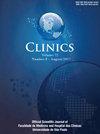The impact of the quarantine period due to the pandemic on the severity of Parkinson's disease and the quality of life of Parkinson's patients
IF 2.4
4区 医学
Q2 MEDICINE, GENERAL & INTERNAL
引用次数: 0
Abstract
Objective
The COVID-19 pandemic has a significant impact on the physical and mental health of people around the world. Parkinson's patients need to visit hospitals regularly to evaluate and adjust the dosage of drugs. Studies have shown that anxiety, exacerbated by existing conditions ‒ including the challenges posed by the COVID-19 pandemic ‒ can aggravate the symptoms of Parkinson's disease. This study aims to assess the impact of the quarantine period on the severity of movement symptoms, quality of life, non-motor symptoms, and the relationship with sex, education level, and age in patients with Parkinson's disease.
Methods
This descriptive cross-sectional study includes 200 patients with Parkinson's disease who were treated in Bu Ali Hospital from April 2019 to the end of 2021. Primary data was collected using the patients' files, which included information on age, gender, education level, medications and dosage, duration of Parkinson's disease, the severity of the disease was evaluated based on the Hohen and Yehr (H&Y) criteria, and Quality of Life (QOL) and the impact of the quarantine period on their illness and quality of life has been collected through the Parkinson's Disease Questionnaire (PDQ-39) questionnaire. The collected data were analyzed using SPSS software, descriptive statistics, t-test, and analysis of variance.
Results
The quarantine period has a significant effect on the severity of Parkinson's disease and quality of life. The mean severity of the disease increased from 2.85 before quarantine to 3.30 during quarantine (p < 0.05), indicating an increase in motor symptoms. Similarly, quality of life scores in all dimensions decreased from 62.8 before quarantine to 48.2 during quarantine (p < 0.05), indicating a decrease in quality of life. Pearson's correlation test was used to investigate the relationship between age and the change in patients’ quality of life and the change in disease severity (p < 0.05).
Conclusion
The quarantine period due to the COVID-19 epidemic has had a significant impact on the severity of Parkinson's disease and the quality of life of patients. The findings of this study indicate the need to develop strategies to provide better health care, social support, and physical activity for patients with Parkinson's disease during quarantine and the pandemic.
大流行导致的隔离期对帕金森病严重程度和帕金森病患者生活质量的影响
目的2019冠状病毒病(COVID-19)大流行对全球人民的身心健康产生重大影响。帕金森患者需要定期去医院评估和调整药物剂量。研究表明,现有条件(包括2019冠状病毒病大流行带来的挑战)加剧的焦虑可能会加重帕金森病的症状。本研究旨在评估隔离期对帕金森病患者运动症状严重程度、生活质量、非运动症状的影响,以及与性别、受教育程度、年龄的关系。方法本描述性横断面研究包括2019年4月至2021年底在布阿里医院治疗的200例帕金森病患者。通过患者档案收集主要数据,包括患者的年龄、性别、受教育程度、药物和剂量、帕金森病病程,根据Hohen和Yehr (H&;Y)标准评估疾病严重程度,并通过帕金森病问卷(PDQ-39)问卷收集生活质量(QOL)和隔离期对患者病情和生活质量的影响。收集的资料采用SPSS软件、描述性统计、t检验、方差分析进行分析。结果隔离期对帕金森病的严重程度和生活质量有显著影响。平均疾病严重程度由隔离前的2.85上升至隔离期间的3.30 (p <;0.05),表明运动症状增加。同样,所有维度的生活质量得分从隔离前的62.8降至隔离期间的48.2 (p <;0.05),表明生活质量下降。采用Pearson相关检验探讨年龄与患者生活质量变化及疾病严重程度变化的关系(p <;0.05)。结论新型冠状病毒肺炎疫情导致的隔离期对帕金森病的严重程度和患者的生活质量有显著影响。这项研究的结果表明,有必要制定战略,在隔离和大流行期间为帕金森病患者提供更好的卫生保健、社会支持和体育活动。
本文章由计算机程序翻译,如有差异,请以英文原文为准。
求助全文
约1分钟内获得全文
求助全文
来源期刊

Clinics
医学-医学:内科
CiteScore
4.10
自引率
3.70%
发文量
129
审稿时长
52 days
期刊介绍:
CLINICS is an electronic journal that publishes peer-reviewed articles in continuous flow, of interest to clinicians and researchers in the medical sciences. CLINICS complies with the policies of funding agencies which request or require deposition of the published articles that they fund into publicly available databases. CLINICS supports the position of the International Committee of Medical Journal Editors (ICMJE) on trial registration.
 求助内容:
求助内容: 应助结果提醒方式:
应助结果提醒方式:


